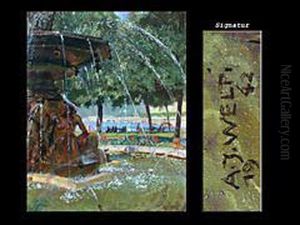Jakob Welti Paintings
Jakob Welti was a Swiss painter, primarily known for his landscape and marine paintings. Born on November 17, 1849, in Aarburg, Switzerland, he developed an early interest in the arts and went on to pursue his passion for painting. Welti's work was influenced by the Swiss landscape, and his paintings often depicted the natural beauty of his homeland with a particular emphasis on the interplay of light and shadow, which adds a dramatic effect to his scenes.
Welti trained at the Kunstakademie in Munich, Germany, where he was exposed to the works of the great masters and contemporary trends in art. Munich was a vibrant artistic center during the second half of the 19th century, and Welti benefited from the dynamic exchange of ideas among artists and the exposure to different styles, notably the Munich School's focus on realism and naturalism.
His art was well-received in his time, and he gained a reputation for his ability to capture the atmosphere of the Swiss countryside and coastal scenes. He was particularly skilled in depicting water, and his seascapes demonstrate a keen observation of the sea's changing moods and the effects of light on water. Welti's landscapes are characterized by a realistic rendering of the Swiss terrain, often highlighting the majestic Swiss Alps, serene lakes, and rural vistas.
Throughout his career, Jakob Welti remained active in the Swiss art community. He participated in numerous exhibitions and was recognized for his contributions to Swiss painting. His works can be found in various Swiss museums and private collections, where they continue to be appreciated for their technical skill and evocative portrayal of nature.
Jakob Welti's dedication to his art continued until his death on December 24, 1917, in Munich. His legacy is preserved in the beauty of his landscapes and seascapes, which capture a timeless essence of Switzerland's natural grandeur. Welti's work remains an important part of Swiss cultural heritage, reflecting the 19th-century artistic movements that shaped European art history.
